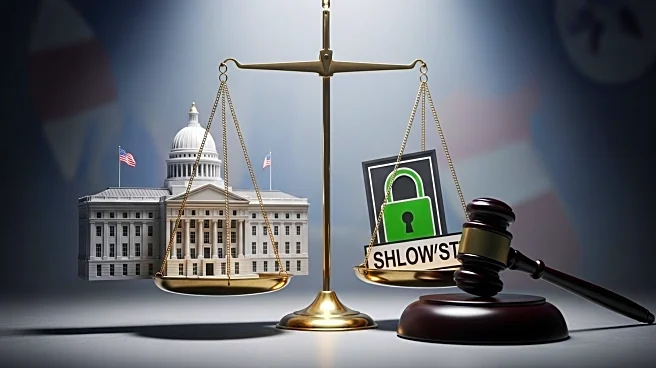What's Happening?
Rep. Joe Morelle, a Democrat from New York, has expressed strong opposition to any potential concessions by Democrats that could lead to a government shutdown. Morelle emphasized the importance of fighting for health care subsidies, suggesting that the benefits of maintaining these subsidies outweigh the negative impacts of a shutdown. His comments come amid ongoing negotiations and debates within Congress regarding budget allocations and the potential for a government shutdown if agreements are not reached. Morelle's stance highlights the internal divisions within the Democratic Party as they navigate the complexities of budgetary decisions and the implications for public policy.
Why It's Important?
The issue of a government shutdown carries significant implications for various sectors in the U.S., including federal employees, public services, and economic stability. Morelle's insistence on prioritizing health care subsidies reflects broader concerns about maintaining essential services and support for vulnerable populations. A shutdown could disrupt government operations, delay public services, and impact economic confidence. The debate underscores the challenges faced by lawmakers in balancing fiscal responsibility with social welfare priorities. Stakeholders such as healthcare providers, federal workers, and beneficiaries of government programs are closely monitoring the situation, as the outcome could directly affect their operations and livelihoods.
What's Next?
As negotiations continue, the Democratic Party faces pressure to reach a consensus that avoids a shutdown while addressing key policy priorities. Morelle's comments may influence discussions within the party, potentially swaying opinions towards maintaining health care subsidies. The coming weeks will be crucial as lawmakers work to finalize budget agreements. Potential reactions from political leaders, advocacy groups, and the public could shape the direction of these negotiations. The outcome will likely have lasting effects on public policy and the political landscape, influencing future legislative strategies and priorities.
Beyond the Headlines
The debate over a government shutdown and health care subsidies touches on deeper issues of governance and public trust. It raises questions about the effectiveness of political negotiation and the ability of elected officials to address the needs of their constituents. The situation also highlights the ethical considerations of prioritizing certain budgetary items over others, reflecting broader societal values and priorities. Long-term, this could influence public perception of political parties and their commitment to social welfare, potentially affecting voter behavior and engagement in future elections.










